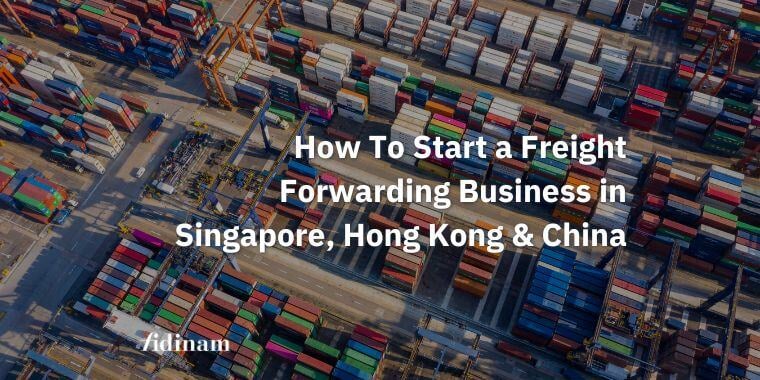
The logistics sector in the Asia-Pacific (APAC) region is flourishing, fueled by globalization and enhanced trade routes.
If you're looking to establish a logistics company or brokerage in Singapore, Hong Kong, or China, it's crucial to understand the incorporation process and tax landscape for smooth operations and long-term success.
Each jurisdiction has specific requirements, procedures, and licensing needed to operate legally and distinct tax policies.
This article provides a summarized guide to help you navigate the incorporation process and taxation in these key logistics hubs.
The freight forwarding sector in Singapore presents a wealth of opportunities for growth and innovation. Here are some compelling reasons to consider launching a freight forwarding business:
A freight forwarding business acts as an intermediary between shippers and transportation services, organizing the movement of goods across international borders. Freight forwarders handle logistics, documentation, and customs clearance, ensuring smooth and efficient transportation of cargo.
In Singapore, a freight forwarding license is obtained through the Maritime and Port Authority (MPA).
The freight forwarding sector in Hong Kong is a vital component of the region's robust logistics and supply chain industry. With its strategic location, advanced infrastructure, and strong regulatory framework, Hong Kong serves as a key gateway for international trade.
Starting a freight forwarding business in Hong Kong requires obtaining a freight forwarding license. Here’s an overview of the process, requirements, and considerations involved in securing this license. A freight forwarding license is essential for businesses that facilitate the movement of goods on behalf of clients.
In Hong Kong, this license is regulated by the Customs and Excise Department, which ensures compliance with local laws and international trade regulations.
The freight forwarding business in China is a crucial component of the country’s logistics and supply chain industry, benefiting from China’s status as a global manufacturing powerhouse and a major player in international trade. Here’s an overview of the key aspects of the freight forwarding sector in China.
In China, freight forwarding services are primarily regulated by the Ministry of Transport (MOT) and local transport authorities.
A freight forwarding license allows companies to operate as logistics intermediaries, providing services such as transportation, customs clearance, and cargo handling.
> To include international maritime cargo transportation in the business scope, the minimum registered capital requirement is RMB 5,000,000.
> To include international air cargo transportation in the business scope, the minimum registered capital requirement is RMB 3,000,000.
> To include international land cargo transportation in the business scope, the minimum registered capital requirements of RMB 2,000,000.
Finally, international freight forwarders in China must increase their registered capital by a minimum of RMB 500,000 per registered branch office engaged in international freight forwarding activities.
Understanding the tax implications for freight forwarding businesses in Singapore, Hong Kong, and China is crucial for effective financial planning and compliance.
Each region has distinct tax policies, including corporate tax rates, GST/VAT, withholding tax and tax incentives. It’s important to know how these differences can impact profitability and operational costs.
Here’s an overview of the tax implications in each location.
|
|
Singapore |
Hong Kong |
China |
|
Corporate Tax Rate |
The corporate tax rate in Singapore is a flat 17%. However, new startups may benefit from partial tax exemptions and tax incentives.
|
Hong Kong has a two-tiered profits tax system. The first HKD 2 million of profits is taxed at 8.25% for incorporated companies, while profits exceeding this threshold are taxed at 16.5%. |
The standard corporate income tax rate in China is 25%. However, eligible small enterprises and certain sectors may benefit from a reduced rate. |
|
Goods and Services Tax (GST) |
GST is set at 9%. Freight forwarding services may be exempt from GST if they are directly related to international transport. |
Hong Kong does not impose a Goods and Services Tax (GST) or Value-Added Tax (VAT), making it advantageous for freight forwarding companies. |
The VAT rate for logistics services, including freight forwarding, typically ranges from 6% to 13%, depending on the service type. Proper invoicing and compliance with VAT regulations are essential. |
|
Withholding Tax |
Withholding tax applies to certain payments made to non-residents, such as royalties and service fees. This could affect arrangements with foreign partners. |
There is no withholding tax on dividends or interest payments, providing further tax efficiency. |
Withholding tax applies to payments made to foreign entities, typically at a rate of 10% on dividends, interest, and royalties, unless reduced by a tax treaty. |
|
Tax Incentives |
The Singapore government offers various tax incentives for businesses, including the Global Trader Programme, which provides tax benefits for qualifying freight forwarding activities. |
The Hong Kong government offers various incentives, such as the "Hong Kong Export Credit Insurance Corporation" that can help mitigate risks associated with international trade. |
China offers various tax incentives for foreign investment in specific regions and industries, including tax holidays and reduced rates for certain qualified businesses. |
Incorporating a Freight Forwarding Company in Singapore, Hong Kong, or China involves a series of steps, including understanding local regulations, preparing documentation, and obtaining the necessary licenses.
Additionally, the tax implications for freight forwarding businesses vary significantly across these jurisdictions. Singapore and Hong Kong provide relatively low corporate tax rates and favorable tax environments, with Hong Kong standing out due to the absence of GST. In contrast, China presents a more complex tax landscape with higher rates and VAT considerations.
Understanding these differences is crucial for optimizing operations and ensuring compliance.
Given the regulatory and tax complexities, consulting local experts can help streamline the process and position your business for success in the thriving APAC logistics market.
Need expert guidance on incorporating your freight forwarding business and navigating tax and compliance requirements in Singapore, Hong Kong, or China?
Contact us today via the form below - our experts are here to help you streamline the process and ensure full compliance with local regulations.
All content © . All Rights Reserved.